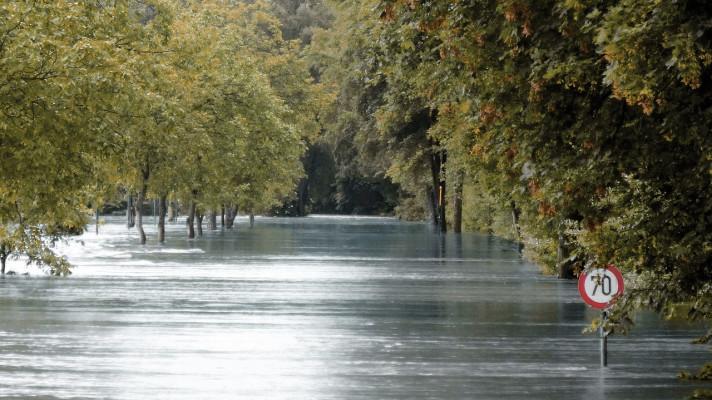SPONGE CITIES - HOW URBAN WETLANDS REDUCE FLOOD RISK
FLOODING IS AN ALL TOO REAL RISK FOR CITIES AROUND THE WORLD. CLIMATE CHANGE HAS MADE THE SIGHT OF WATERLOGGED HOMES AND BUSINESSES A REGULAR ONE IN THE MEDIA. NOW, ENVIRONMENTALISTS SAY ENCOURAGING WETLANDS IN URBAN AREAS COULD BE PART OF THE SOLUTION TO THE PROBLEM.
An area permanently or seasonally saturated with water, a wetland is a catch-all term for water bodies such as lakes, rivers, swamps, marshes, wet grasslands and peatlands. Two thirds of the world's wetlands have been lost over the last century as a result of land-use change and urban expansion, and in Europe wetlands have significantly decreased in size and quality with many being polluted at an alarming rate.
While dams, levees, floodwalls and drainage systems are the go-to techniques for managing flood risk, incorporating more wetlands into urban landscapes could be just as effective according to experts. Last week, this year's World Wetlands Day - which was set up on 2 February 1971 to mark the signing of an international convention on wetlands' conservation - focused on the benefits of urban wetlands.
Urban wetlands can include rooftop gardens and permeable pavements that effectively soak up rainfall. In China, 30 cities have signed up to an initiative called 'sponge cities' which aims to ensure that 80% of each city features enough wetlands to absorb 70 per cent of storm water runoff by 2030. Urban wetlands can also provide other benefits to cities such as purifying air, supporting nature, improving water quality, and making cities more pleasant places to live.
Martha Rojas Urrego, Secretary General of the Ramsar Convention on Wetlands, said:
"A rapidly growing urban population comes with enormous challenges for city planners and managers. They have to ensure that cities today can deliver not only basic services such as accommodation, transport and water, but that these cities are safe, resilient and environmentally friendly. During storms, urban wetlands absorb excess rainfall, which reduces flooding in cities and prevents disasters and their subsequent costs. The abundant vegetation found in urban wetlands, acts as a filter for domestic and industrial waste and this contributes to improving water quality."
In 2017, floods devastated communities in Bangladesh, India and Nepal killing 1300 people. And in January 2018 the River Seine in Paris rose to record levels. According to risk management firm Munich, the annual global cost of flood damage is in the region of between 30-60 billion US dollars, and a recent World Bank study showed that if no action is taken flood damage to coastal cities could cost one trillion dollars a year by 2050. Floods displaced more than 100 million people between 2008 and 2014 alone.
Flood risk also occurs when rivers burst their banks due to heavy rainfall; wetlands on floodplains are needed to soak up this excess water. But with nearly half of all urban development between today and 2030 set to occur in areas with elevated risks of flooding - i.e. floodplains - this could have a devastating impact, sending higher volumes of floodwater thundering towards homes.
Martha Rojas Urrego added:
"Today's current development of human settlements is a major concern for wetland conservation and wise use. As cities grow and demand for land increases, the tendency is to encroach on wetlands. They are often viewed as wasteland available to dump waste or be converted for other purposes."
In Europe, the Commission is about to kick-start an evaluation of the Water Framework Directive - the main piece of EU law that protects waterways.
Leonardo Mazza, Senior Policy Officer on Biodiversity and Water at the European Environmental Bureau, said:
"European commitments to improving the state of the EU's water bodies need to be taken more seriously by EU governments. If we are to continue benefiting from the multiple benefits delivered by wetlands we need to see stepped up efforts and investments towards restoring our water bodies and further measures to reduce the negative impacts from pollution and changes in the physical structure of water bodies due to, for example, hydropower plants."
And wetlands are hitting the headlines beyond Europe's borders too. Just this week an international foundation that champions the protection of lakes and wetlands has given Lake Bolgoda and Lake Madampe in the southwest region of Sri Lanka the unwanted accolade of 'threatened lakes of the year'.
Ekanayake Abeyrathne, Director of EMACE Foundation of Sri Lanka, said that one of the most severe problems for Lake Bolgoda was mangrove destruction due to encroaching construction towards the lake including "for hotels and bungalows". He said that other severe problems for Lake Bolgoda are "destruction of habitats that support endangered species, water pollution, and loss of livelihood within the community due to ecosystem degradation".
Mechtild Rössler, Director of UNESCO's World Heritage Centre, said:
"Wetlands play a vital role for cities and for the whole of humanity. For instance, they serve as a source of drinking water; they reduce flooding and the vegetation of wetlands filters domestic and industrial waste and improves water quality."
Water is the common element that runs through all 17 Sustainable Development Goals (SDGs) - the UN's global crisis plan agreed by world leaders in 2015 on ending poverty and protecting the planet.
"This story first appeared on the EEB news channel METAmag.org and you can see it by clicking here"
